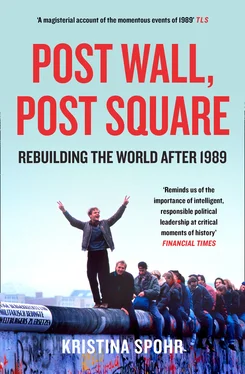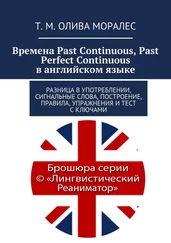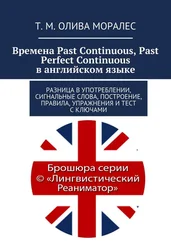In addition to his grand vision, Gorbachev made specific proposals, especially terminating the nine-year intervention in Afghanistan, the USSR’s equivalent of America’s Vietnam, and on disarmament, which he called ‘the most important topic, without which no problem of the coming century can be resolved’. He spoke of the need for a new strategic arms-reduction treaty (START), reducing each superpower’s arsenal by 50%. And, to put pressure on the United States, he unveiled a unilateral proposal to cut the Soviet troop strength in Europe by half a million men over the next two years. In this way Gorbachev sought to initiate a shift from the ‘economy of armament’ to an ‘economy of disarmament’.
Such a conversion had become absolutely essential to underpin his project of a ‘profound renewal’ of the entire socialist society – a project that had grown vastly in scope since 1985 as he developed his big ideas of perestroika and glasnost. Indeed, Gorbachev explained, ‘under the sign of democratisation, perestroika has now spread to politics, the economy, intellectual life and ideology’. Soviet democracy would be ‘placed on a solid normative base’ including ‘laws on the freedom of conscience, glasnost, public associations and organisations’. Nevertheless, in order not to tempt anybody to ‘encroach on the security’ of the Soviet Union and its allies while the Kremlin undertook the much-needed ‘bold revolutionary transformations’, Gorbachev was adamant that the USSR’s defence capability should be maintained at what he termed a level of ‘reasonable and reliable sufficiency’. Such language was a marked change from the pursuit of ‘superiority’ that had dominated East–West relations for most of the Cold War. Serious differences still existed, he admitted, and tough problems had to be resolved between the superpowers but the Soviet leader was essentially upbeat about the future as he looked around the hall: ‘We have already graduated from the primary school of learning to understand each other and seek solutions in both our own and common interests.’[16]
Near the end of his speech he acknowledged the work of President Reagan and his Secretary of State, George Shultz, in forging agreements. ‘All this’, he said, ‘is capital that has been invested in a joint undertaking of historic importance. It must not be wasted or left out of circulation. The future US administration headed by newly elected President George Bush will find in us a partner, ready – without long pauses and backward movements – to continue the dialogue in a spirit of realism, openness, and goodwill, and with a striving for concrete results, over an agenda encompassing the key issues of Soviet–US relations and international politics.’[17] Bush was not in the audience – he watched the speech on television – but he could not have missed the message. As Gorbachev had told the Politburo before leaving Moscow, with his diplomatic offensive there would be ‘nowhere for Bush to turn’.[18]
Gorbachev’s aide Anatoly Chernyaev was in the audience. Having helped write the speech, he had expected it would make an impression but was not prepared for the reaction that morning. ‘For over an hour nobody stirred. And then the audience erupted in ovations, and they would not let [Gorbachev] go for a long time. He even had to get up and bow as if he were on stage.’[19] Gorbachev, a great showman, lapped it all up. Much of the press reaction was also positive. The New York Times editorialised, ‘Perhaps not since Woodrow Wilson presented his Fourteen Points in 1918 or since Franklin Roosevelt and Winston Churchill promulgated the Atlantic Charter in 1941 has a world figure demonstrated the vision Mikhail Gorbachev displayed.’[20] But others looked behind the occasion and the rhetoric. The Christian Science Monitor , for instance, drew attention to what Gorbachev did not say. There was no suggestion that the Kremlin intended to pull back fully from its farthest positions of strategic influence gained in the Second World War – in East Germany and in East Asia. Indeed the speech said virtually nothing about Asia. Armed forces in Soviet Asia would be reduced, he promised, and ‘a major portion’ of Soviet troops temporarily stationed in the Mongolian People’s Republic would ‘return home’. But there was no mention of the bases in Vietnam, the Monitor complained, and not a word about the four northern Japanese islands seized by Stalin in 1945 whose disputed status had blocked a peace treaty between Japan and the USSR to formally end the Second World War.[21] The newspaper had a point – Gorbachev’s post-Cold War vision was selective – but the UN speech made clear that for him the cockpit of the Cold War lay in Europe. It was there that the tension had to be defused.
As soon as his show at the United Nations was over,[22] Gorbachev turned his mind to the next event in his packed New York schedule: a meeting with President Reagan and Vice President Bush on Governors Island, off the southern tip of Manhattan. Yet in the limo down to the pier at Battery Park, the Soviet leader had to take an urgent phone call from Moscow: a major earthquake had hit the Caucasus and the latest reports said that some 25,000 people in Armenia had died. Gorbachev decided to return home the next morning, without stopping over in Cuba and London as originally planned.[23] Controlling his anxieties, Gorbachev turned his mind during the short boat ride to what would be his fifth and farewell meeting with Reagan, the man he no longer considered an ‘unreconstructed Cold Warrior’ but instead with whom he had managed against the odds to develop a genuine fondness and friendship.[24]
As Bush watched the ferry coming towards him across the choppy waters of New York Harbor, he sensed a feeling of tense expectation among the waiting American and Soviet officials. He was certainly on edge himself. As president-elect, a few weeks away from inauguration and not yet in a position to set policy, he had to weigh his future role against his present status as merely Reagan’s deputy. He knew Gorbachev would be anxious to know in which direction he intended to take relations with the Soviet Union, but Reagan was still the man in the Oval Office. On this particular day Bush wanted to avoid doing anything that could be interpreted as undermining the current president’s authority or to circumscribe his own future freedom of action.[25]
Gorbachev walked off the boat – waving to the onlookers, a broad smile on his face – and an equally cheerful Reagan greeted him on the quayside. The two delegations were soon sitting in the commandant’s residence on Governors Island. Conversation during their meeting was mostly light and nostalgic: it was not a ‘negotiating session’, as Gorbachev remarked to the media present. Yet it was in some way ‘special’, as Bush put it, because of his own double role, looking to the past and the future.[26]
After the journalists and photographers had left, Reagan and Gorbachev reminisced about their first encounter in Switzerland a mere three years before, and the president offered the Soviet leader a memento – a photo of the moment they met in the parking lot with Reagan’s handwritten inscription that they had ‘walked a long way together to clear a path to peace, Geneva 1985–New York 1988’. Gorbachev was touched and said how much he valued their ‘personal rapport’. Reagan agreed. He felt proud of what they had ‘accomplished together’: two leaders who had the ‘capability of creating the next world war’ had decided ‘to keep the world at peace’[27] and so they had laid a ‘strong foundation for the future’. This was possible, he claimed, because they had always been ‘direct and open’ with each other. What Reagan did not mention – naturally, because this was a cosy wander down memory lane – was that their Moscow summit in May/June had failed to ‘crown’, as Gorbachev hoped, the procession of meetings with a treaty to reduce their strategic offensive weapons – START I. This, as Gorbachev emphasised in his UN speech, was significant unfinished business.[28]
Читать дальше












